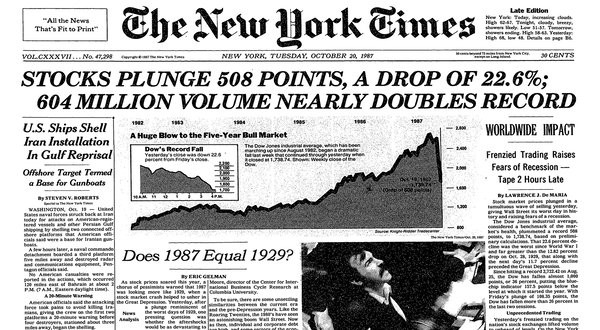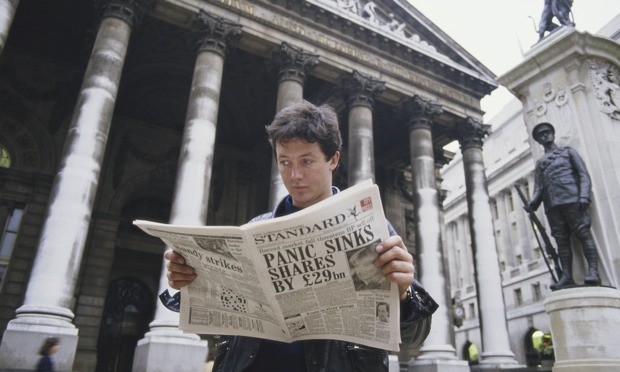The Crash of October 1987 Could Happen Again
Post on: 26 Сентябрь, 2015 No Comment

Stocks rallied sharply during September, but they stagnated during the last week of the month after running into overhead resistance levels.
Meanwhile, trading volume continued to be very light, indicating that only a small number of stock-market participants remain active in the markets.
Of utmost concern, several economic statistics released during the past few weeks indicate that economic conditions in both the United States and numerous foreign economies will likely slow further during the months ahead.
For example, industrial production and sales at retail outlets in both the United States and Europe slowed considerably. Specifically, the pace of growth in industrial production at U.S. factories, mines, and utilities slowed to a year-over-year rate of 6.2 percent during August from 7.4 percent during July and 8.2 percent during June. On an annualized quarterly basis, industrial production rose only 1.3 percent during August, compared to 7.8 percent during July.
In light of the fact that manufacturing activity throughout the United States also slowed considerably during the past few months, I expect industrial production to continue to slow during the coming months.
Meanwhile, the pace of retail sales in the United States, adjusted for inflation, slowed to a year-over-year pace of only 2.7 percent during August, compared to 4.2 percent during the prior month and a recent high of 6.3 percent this past April. With the backlog of orders from retailers and wholesalers for manufactured goods declining sharply during September, theres a good chance that retail sales will decline further during the months ahead.
Separately, manufacturing activity in the United Kingdom declined to its lowest level in 10 months, and manufacturing activity in the 16-nation eurozone rose at the slowest pace since February.
The fact that a substantial number of job seekers both here and abroad are unable to get a job (with the total unemployment rate in the United States remaining at around 17 percent and the unemployment rate in the eurozone remaining at the highest level since 1998) also bodes poorly for the direction of industrial production and retail sales.
Thats very significant because overall economic conditions tend to move in the same direction, and to change direction at about the same time, as retail sales and industrial production.
Yet, investors around the globe seem to be rather complacent about the economic developments mentioned above, with current stock-market participants bidding up stocks substantially during September.
The most likely cause behind the recent advance in stocks is the fact that many investors and economists expect the Federal Reserve to enter a new wave of quantitative easing within the next few weeks. Yet, my research indicates that the Fed wont embark on such a mission. If my forecast is correct, theres a good chance that investors will be very disappointed in such a revelation, if it comes to fruition, and that stocks will then sell off sharply in response to the deteriorating economic factors that I mentioned above.

If Wall Street analysts begin to lower their third-quarter earnings estimates for publicly traded companies, my research suggests that stocks might fall sharply within the next few weeks in a manner similar to the way that they did during October 1987.
Interestingly, just like theyve done during the past few months, industrial production, manufacturing activity, and retail sales slowed considerably during the months leading up to the stock-market plunge of October 1987 just like theyve done during the past few months of this year.
Note from Moneynews:
If youd like to learn about Mr. Fraziers analysis of important economic and geopolitical factors and how to profit during different types of investment environments, try a free sample of Davids investment-advisory service, The ETF Strategist. The service helped investors generate a 35.8 percent investment return since its inaugural edition on Sept. 18, 2007, through Aug. 31 of this year. In comparison, the S&P 500 Index lost 24 percent of its value during that same period. Click Here to Find Out More .
David Frazier is a member of the Moneynews Financial Brain Trust. Click Here to read more of his articles. He also writes two very successful investment newsletters. Discover more by Clicking Here Now .
2015 Newsmax Finance. All rights reserved.














